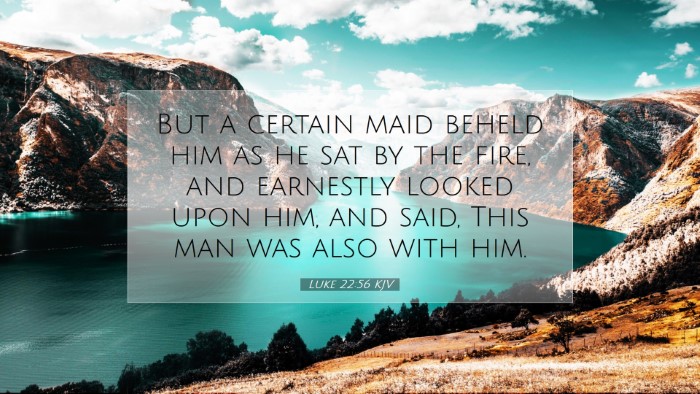Commentary on Luke 22:56
Verse: "But a certain maid beheld him as he sat by the fire, and earnestly looked upon him, and said, This man was also with him."
Introduction
This verse occurs during the time of Jesus' trial after His arrest, where Peter finds himself in a precarious position, warming himself by the fire in the courtyard of the high priest's palace. The significance of this passage extends beyond a mere observation; it encapsulates themes of identity, fear, and the eventual realization of prophetic fulfillment. Through the lens of multiple public domain commentaries, we can distill profound insights suitable for pastors, students, theologians, and Bible scholars.
Contextual Background
In the preceding chapters, the events leading up to Jesus' trial are marked by increasing tension and betrayal among His closest disciples. Peter, who had boldly declared his loyalty to Jesus, now finds himself amidst the very danger he sought to avoid. This verse captures a critical juncture in Peter's journey of faith, and the focus on a maid's recognition of him underscores the reality of his impending denial.
Commentary Insights
Matthew Henry's Perspective
Henry points out that the maid’s observation serves as a moment of divine providence where ordinary circumstances elevate spiritual truths. Her statement encompasses a direct challenge to Peter—a reminder of his earlier commitments. Henry emphasizes the psychological state of Peter, highlighting his fear and denial in this pivotal moment. He illustrates that Peter's attempt to blend in with the crowd betrays his internal conflict and the stark contrast between his professed loyalty and his current behavior.
Albert Barnes' Analysis
Barnes notes that this recognition by the maid initiates the first public challenge to Peter's identity as a follower of Christ. He asserts that this moment foreshadows the three denials that Peter will make. The phrase “earnestly looked upon him” implies a scrutiny that goes beyond mere recognition. It highlights a certain expectation from the maid, potentially symbolizing the society’s collective witness of a believer's actions. Barnes argues that this highlights the danger of compromising one’s faith in times of adversity.
Adam Clarke's Commentary
Clarke provides a detailed examination of the cultural implications of the maid's declaration. He reasons that her position as a servant girl gives weight to her challenge. The contrast between her status and Peter's former prominence as a disciple serves to intensify Peter’s shame and fear. Clarke elaborates on the narrative’s structure by emphasizing how the ensuing denials illustrate the broader theme of human frailty in confronting persecution. He concludes that amidst Peter's lapse in courage lies an opportunity for redemption and restoration, which the subsequent narrative of Peter’s repentance encapsulates.
Theological Themes
- Identity and Discipleship: The maid’s confrontation raises questions about Peter’s identity. As theological commentators suggest, one's identity in Christ should withstand the pressures of societal scrutiny. This moment invites reflection on the costs of discipleship and the dangers of cultural conformity.
- Fear and Faith: Peter's fear of association with Jesus reveals the struggle between faith and trepidation that often accompanies moments of trial. The text invites believers to consider how fear can lead to spiritual compromise.
- Prophecy and Fulfillment: This moment aligns with Jesus' foretelling of Peter's denials (Luke 22:34). The connection emphasizes the sovereignty of God in orchestrating events that fulfill His word, serving as a reminder of the divine plan that undergirds all Scripture.
- Grace and Restoration: The narrative trajectory suggests that despite human frailty, grace remains available. Peter’s recovery from this moment of failure highlights the transformative power of repentance and the assurance of Christ’s love.
Practical Applications
This passage not only invites theological reflection but also challenges practical discipleship:
- Stand Firm in Identity: Believers are encouraged to stand firm in their identity as followers of Christ, even when facing societal pressures or persecution.
- Responding to Fear: The narrative serves as an important lesson in responding to fear with faith, reminding pastors and leaders to equip their congregations to face adversity with courage.
- Embrace Grace: Recognizing the availability of God's grace, even in failure, encourages believers to pursue restoration instead of succumbing to guilt and shame.
- Encourage Confession: The importance of confession and accountability within the Christian community is underscored, promoting a culture of grace where believers can find support during trials.
Conclusion
Luke 22:56 stands as a critical verse rich with layers of meaning relevant to the Christian experience. The insights drawn from the commentaries of Matthew Henry, Albert Barnes, and Adam Clarke yield a multifaceted understanding of identity, fear, and grace within the narrative. This passage offers not only a historical account of Peter's denial but also a timeless reminder of the struggles and triumphs faced by believers throughout the ages. As pastors, students, theologians, and scholars delve into this text, it serves as both a cautionary tale and a profound witness to the power of grace and the restorative love of Christ.


